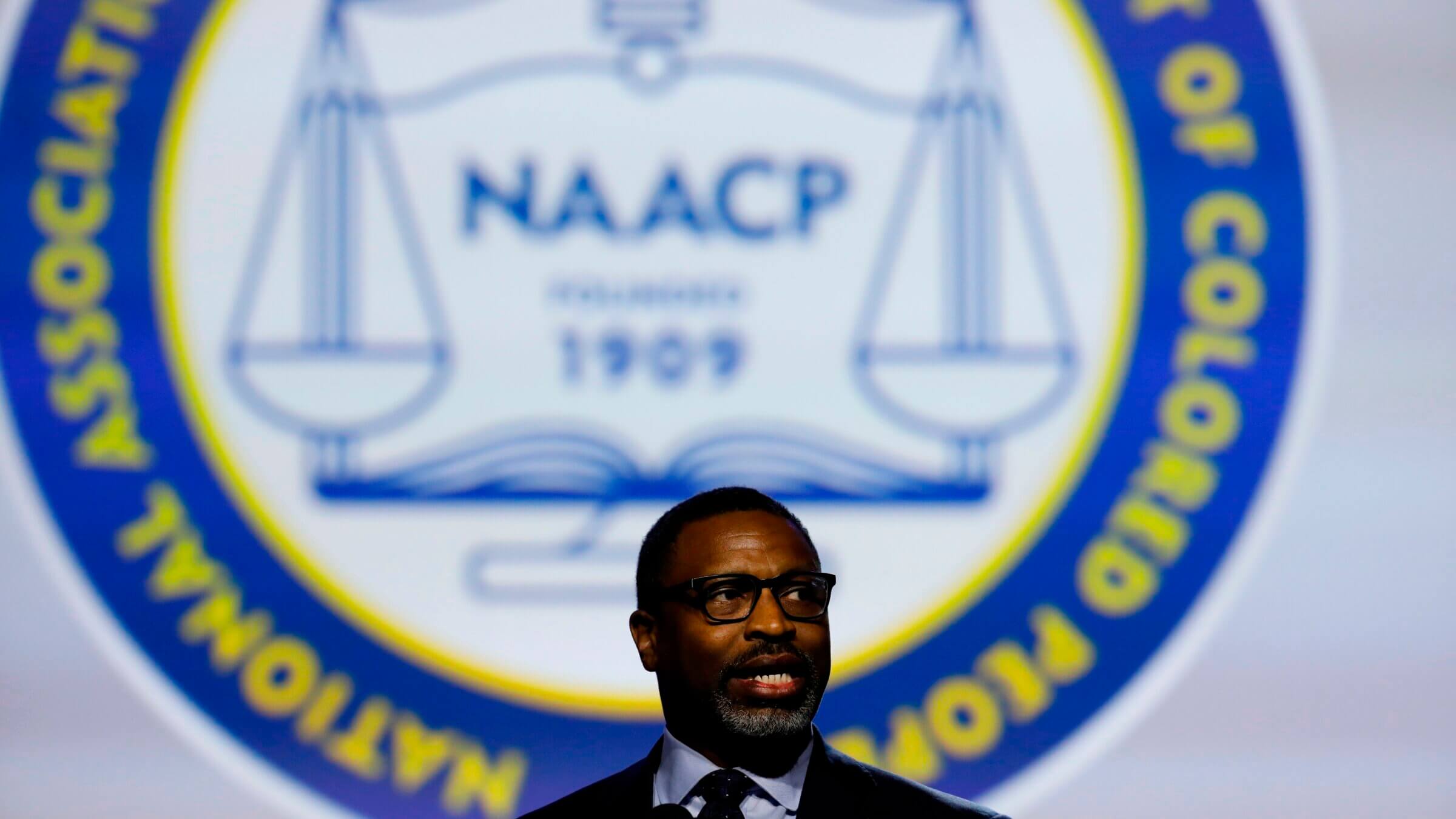NAACP alters statement calling for end to weapon shipments to Israel after criticism
“We do respect the right for Israel to defend itself,” a spokesperson said. “But we don’t think American tax dollars should be going to bomb civilians.”

Derrick Johnson, president the NAACP, issued a statement calling for a ceasefire in Gaza and for the Biden administration to end weapon transfers to Israel Thursday before the organization removed it hours later. Photo by Getty Images
The NAACP altered a watershed statement calling for a “permanent ceasefire” in Gaza and the suspension of American weapon shipments to Israel Friday morning to specify it that it only wanted to stop the shipment of weapons “targeting civilians.”
“We didn’t want folks to be confused as to exactly what we were calling for because we do respect the right for Israel to defend itself,” Alicia Mercedes, an NAACP spokesperson, said in an interview. “But we don’t think American tax dollars should be going to bomb civilians.”
The change was only made to the headline of the online press release, though Mercedes said the edit caused the original statement to disappear from the website. The Wayback Machine, which archives websites, showed the statement disappearing around 11:30 p.m. Thursday night and the Forward reported earlier on Friday that it had been removed.
“The Middle East conflict will only be resolved when the U.S. government and international community take action, including limiting access to weapons used against civilians,” Derrick Johnson, the group’s chief executive, said in the statement.
In an interview with CBS News, Johnson said that Israeli Prime Minister Benjamin Netanyahu was a “fascist” who was “no different than Hamas,” though he also appealed for unity.
“Communities should be talking about how we can work together not about the things that divide us, and it is unfortunate that we’re here at this juncture,” he said.
The NAACP was founded by both Black and Jewish lawyers and advocates in 1909, and has maintained close ties with many Jewish organizations even as other Black-led civil rights organizations distanced themselves during the 1960s and 1970s. Rabbi Jonah Pesner, who runs the Religious Action Center of Reform Judaism, and Randi Weingarten, the Jewish president of the American Federation of Teachers, both sit on the NAACP’s board.
Pesner said in an email Friday that “many of us in the Jewish community are deeply disappointed in the statement, on both process and substance.”
“Fundamentally, we share a yearning for an end to this war and the horrific suffering of too many innocent civilians,” Pesner also said. “I am committed to continuing to work with the NAACP, the nation’s oldest civil rights organization, which has always worked in allyship with the Jewish community, to strengthen our common struggle to further civil rights for all, to combat antisemitism and to understand our perspective and hold multiple truths during this most challenging time.”
Mercedes, the NAACP spokesperson, said the board is usually not involved in press statements and did not review or approve the one released Thursday. She said the headline of the statement was changed to make clear that the organization did not oppose funding for Israel’s Iron Dome missile defense system.
“It seemed like a lot of folks aren’t reading the full statement,” she said.
Potential strain on relationships
Jonathan Greenblatt, chief of the Anti-Defamation League, which has hosted Johnson at its annual conference and whom Greenblatt has referred to as a “friend,” said he was “dismayed and hurt” by the statement.
“It fails to acknowledge all the factors and realities that led to the Israel-Hamas war,” Greenblatt wrote on X, formerly Twitter. “We’re concerned about the effects it may have on intensifying antisemitism and bias against Jews in America.”
But Mercedes said the NAACP was not worried about damaging its ties with American Jews.
“There is a distinct separation between the Jewish community and the state of Israel,” she said. “We continue to support the Jewish community and many members of the Jewish community express the same concerns we do.”
Asked about the NAACP’s partnerships with the Anti-Defamation League, where Johnson serves as co-chair of its sports leadership council, and the Reform movement, both of which staunchly oppose any limits on American aid to Israel, Mercedes said: “Everybody is entitled to their opinion and we’re going to continue to stand with the Jewish community as a whole.”
Marc Dollinger, author of Black Power, Jewish Politics, said that he was initially struck by the NAACP statement. “This is the most mainstream of the Black civil rights organizations in terms of their relationship with the Jewish community,” Dollinger said in an interview. “They would be the last one that I would think would do this.”
But he said that upon a closer reading, the statement appeared tailored to address the concerns of many American Jews. It emphasized the tragedy of the Oct. 7 terrorist attack and the need to return Israeli hostages still held by Hamas, and also called for an end to American arms sales to “states that supply weapons to Hamas.”
“The more I read, I was like, ‘OK, in a certain weird way that sounds like it could be perfectly acceptable to Jewish organizations,'” Dollinger said.
Not everyone found it so agreeable. Abe Foxman, the former longtime head of the ADL, questioned the statement on X yesterday. “What would MLK do? Not this!” Foxman wrote. “Sad betrayal of your Jewish allies.”





















